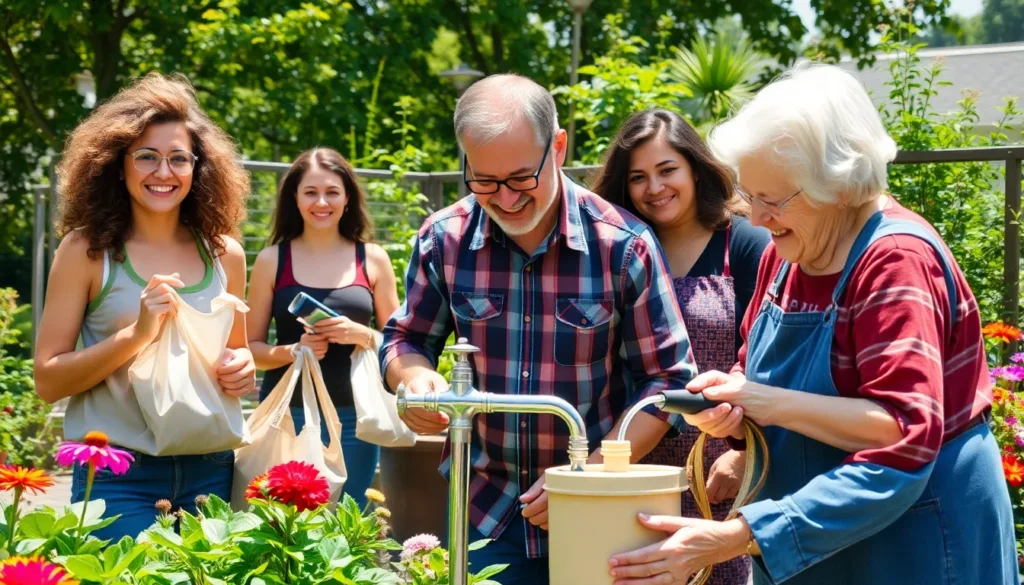Table of Contents
ToggleIn a world where resources seem as abundant as a teenager’s appetite, it’s easy to overlook the importance of saving them. But hold on! What if those precious resources could be saved with just a few simple changes? Imagine a life where you can keep your wallet happy while saving the planet—now that’s a win-win!
Saving resources isn’t just about being eco-friendly; it’s about being smart. From turning off lights when leaving a room to embracing the magic of reusable bags, small actions can lead to big changes. So why not join the movement and become a resource-saving superhero? After all, every little bit counts, and who doesn’t want to be the hero of their own story? Let’s dive into the art of saving resources and discover how easy it is to make a difference without sacrificing comfort or style.
Importance of Saving Resources
Saving resources significantly benefits both the environment and personal finances. Energy conservation, for instance, reduces electricity bills while lowering carbon footprints. Water-saving practices directly contribute to preserving natural habitats and reducing utility costs.
Implementing these changes demonstrates a commitment to sustainability. Simple actions, such as fixing leaks and turning off faucets, can lead to substantial water savings over time. Organizations like the U.S. Environmental Protection Agency highlight that small shifts collectively produce monumental effects on resource preservation.
Resource-saving habits, such as utilizing public transportation or carpooling, minimize fossil fuel use and decrease traffic congestion. Communities experienced improved air quality when residents adopted these practices. Additionally, choosing reusable bags over single-use plastic options reduces pollution and waste in landfills.
Time spent on resource conservation promotes awareness and engagement with environmental issues. Individuals inspire others by showcasing their resource-saving efforts, creating a ripple effect. Prioritizing sustainable behaviors, they contribute to a future that values natural resources over convenience.
Ultimately, transitioning to resource-saving habits represents a collective movement toward a sustainable lifestyle. Every action counts, reinforcing the message that individuals wield influence over their environment. Engaging in these practices fosters a shared responsibility for protecting the planet.
Ways to Save Resources

Saving resources benefits both individuals and the environment. Several straightforward actions can yield remarkable results.
Energy Conservation
Tuning energy consumption down leads to lower bills. Switch to LED bulbs for efficient lighting. Unplugging devices when not in use can prevent energy waste. Utilizing smart thermostats optimizes heating and cooling schedules. Engaging in energy audits identifies inefficiencies in homes. Setting computers to sleep mode conserves electricity during breaks. Moreover, using public transportation saves fuel and reduces emissions. Each energy-saving practice contributes to a smaller carbon footprint.
Water Conservation
Implementing simple water-saving measures protects vital resources. Fixing leaky faucets prevents unnecessary water loss. Installing low-flow showerheads and faucets can reduce water usage significantly. Collecting rainwater for irrigation helps maintain gardens sustainably. Turning off the tap while brushing teeth or washing dishes conserves gallons of water daily. Using efficient appliances saves both water and energy. In addition, understanding local water conservation regulations encourages responsible water use. Every drop contributes to preserving freshwater sources.
Waste Reduction
Minimizing waste supports a cleaner environment. Adopting reusable bags for shopping cuts down on plastic use. Composting biodegradable waste enriches soil while reducing landfill contributions. Choosing products with minimal packaging reduces overall waste. Donating items in good condition extends their life cycle and benefits others. Participating in community recycling programs ensures materials are repurposed. Additionally, buying in bulk reduces packaging and saves money. Every small change in waste management creates a significant positive impact.
Benefits of Saving Resources
Saving resources offers numerous advantages, impacting both personal finances and the environment positively. Individuals can realize financial savings while promoting sustainability.
Economic Advantages
Lowering energy bills contributes directly to savings. Using energy-efficient appliances and LED bulbs helps reduce monthly electricity expenses. Water conservation efforts, such as fixing leaks and installing low-flow showerheads, lead to lower water bills. Engaging in recycling and composting can decrease waste disposal costs over time. Collectively, these habits minimize household expenses, making resource conservation economically beneficial.
Environmental Impact
Reducing resource consumption significantly benefits the environment. Energy conservation leads to lower carbon emissions, aiding in the fight against climate change. Water-saving practices sustain natural habitats, protecting wildlife and ecosystems. When individuals carpool or use public transportation, there’s a decrease in fossil fuel use, resulting in improved air quality. Each small action contributes to a healthier planet, emphasizing the responsibility everyone shares in preserving natural resources.
Challenges in Saving Resources
Resource conservation faces several significant challenges. Awareness of resource scarcity tends to be low among individuals. People often underestimate the impact of small daily actions on resource depletion. Additionally, convenience frequently takes precedence over sustainability in many decisions.
An ingrained culture of disposability complicates efforts to save resources. Many individuals prefer single-use products due to their immediate convenience, neglecting the long-term consequences. Financial constraints can also hinder investments in energy-efficient appliances or sustainable home improvements.
Behavioral inertia presents another obstacle. Habits formed over time resist change, making it difficult for individuals to adopt more sustainable practices. Resistance to change often stems from a lack of immediate visible benefits, leading to complacency regarding resource management.
Access to information and resources varies widely. Communities with fewer resources may face challenges in adopting green technologies or effective conservation practices. Education on the importance of saving resources rarely reaches all demographics equally, limiting overall impact.
Lastly, governmental policies sometimes fail to support sustainable practices. Lack of incentives or regulations can diminish motivation to conserve resources. Collaboration among individuals, communities, and governments becomes essential to overcome these hurdles.
Tackling challenges like awareness, convenience, cultural attitudes, and policy support is crucial. Overcoming these barriers can foster a more engaged approach to saving resources at individual and collective levels.
Embracing resource-saving habits is essential for creating a sustainable future. By making small changes in daily routines individuals can significantly impact both their finances and the environment. Every action counts from turning off lights to using public transportation.
As more people adopt these practices they inspire others to follow suit fostering a culture of conservation. Overcoming challenges like convenience and awareness is vital for effective resource management. With collective effort and commitment to sustainability everyone can become a resource-saving superhero. The journey toward a greener planet starts with each person’s choices.







